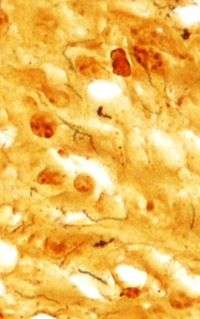Dieterle stain
The Dieterle stain is a way of marking tissue for microscopic examination. The key reagent of Dieterle stain is silver nitrate. It can stain microbes like Treponema pallidum in grey or black and background in yellow.[1][2]

Dieterle stain showing Treponema pallidum(in black), the organism that causes syphilis.
It is used to find the organisms that cause cat-scratch disease (Bartonella henselae) and syphilis (Treponema pallidum) and sensitive for Mycobacterium tuberculosis.[3]
Additional images
gollark: I like to have a tab open in my terminal with `tail -f /var/log/nginx/access.log` open.
gollark: Sure, send them over.
gollark: I can spy on visitors!
gollark: They're cool!
gollark: I'm not interested much in whatever you're saying, so I'm randomly saying stuff which I'm thinking about while reading these logs.
See also
- Staining
- Warthin-Starry stain
References
- "Dieterle stain". Farlex.
- "protocol for Dieterle stain" (PDF). Archived from the original (PDF) on 2016-08-28. Retrieved 2017-12-18.
- Brady, JG.; Schutze, GE.; Seibert, R.; Horn, HV.; Marks, B.; Parham, DM. "Detection of mycobacterial infections using the Dieterle stain". Pediatr Dev Pathol. 1 (4): 309–13. PMID 10463293.
External links
- Dieterle stain - mondofacto.com.
This article is issued from Wikipedia. The text is licensed under Creative Commons - Attribution - Sharealike. Additional terms may apply for the media files.
